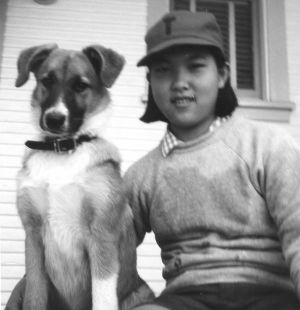
 My memory of the event is pretty hazy. Somehow I must have heard about the
eclipse and convinced my younger brothers to watch it with me. We went out
into the backyard and sat on a blanket to wait. I fell asleep, and when I
awoke, only my puppy was still out there with me (a nice little ball of
warmth in the cold night!).
Overhead the moon was in total eclipse, colored a spooky, reddish hue.
My memory of the event is pretty hazy. Somehow I must have heard about the
eclipse and convinced my younger brothers to watch it with me. We went out
into the backyard and sat on a blanket to wait. I fell asleep, and when I
awoke, only my puppy was still out there with me (a nice little ball of
warmth in the cold night!).
Overhead the moon was in total eclipse, colored a spooky, reddish hue.
The puppy is key to figuring out the date of the eclipse. I found her wandering the grounds of my middle school, but when I tried to turn her in at the office, they suggested I keep her (and my parents said ok!). I remember showing my 8th grade teacher this photo of me with my grown dog, so the eclipse (as well as finding the puppy) must have occurred in 1967 or 1968, when I was in 7th grade.
Next I turned to the Five Millennium Catalog of Lunar Eclipses (compiled by Fred Espenak, aka Mr. Eclipse), which covers lunar eclipses from -1999 to +3000 (2000 BCE to 3000 CE). Yes, there really is such thing (also for solar eclipses)!
Looking at lunar eclipses from 1901 to 2000, there are two possibilities:
(above I've converted the time of greatest eclipse from terrestrial dynamical time to Pacific Standard Time).I'm going to guess it was the April'68 eclipse, because I remember the skies being clear; checking local weather in 1967 and 1968, it looks like the nightly weather in October'67 was generally hazy/foggy, while April'68 was relatively clear.
Also, I don't remember being up at 2am (not rare now, but it would have been back then!).
Total Lunar Eclipse 1404.15
If you're interested in the
1404.15
total lunar eclipse, it will be on a Monday night Pacific Time. It's
best seen from a dark area, away from city lights, but you can see it from
anywhere in Southern California (or indeed from most of the Western Hemisphere),
given clear skies.
Here is the timeline, using a
UT to PT
time converter:
P1 Penumbral Eclipse Begins 04:53:37 UT 9:54pm PDT
U1 Partial Eclipse Begins 05:58:19 UT 10:58pm PDT
U2 Total Eclipse Begins 07:06:47 UT 12:07am PDT
Greatest Eclipse 07:45:40 UT 12:46am PDT
U3 Total Eclipse Ends 08:24:35 UT 1:25am PDT
U4 Partial Eclipse Ends 09 33:04 UT 2:33am PDT
P4 Penumbral Eclipse Ends 10:37:37 UT 3:38am PDT
At the very least, try to look at the moon at about 9:50pm (or 3:40am) and at
12:45am. That way you can see the huge contrast between the bright full moon
and the maximally eclipsed moon.
Update 1404.16: I've added a post about how to watch a lunar eclipse, which also includes a few notes about watching the 1404.15 eclipse (also added a header for that eclipse above, as well as time tags U1..P4).
Update 1406.12: Added article to newly created eclipse series